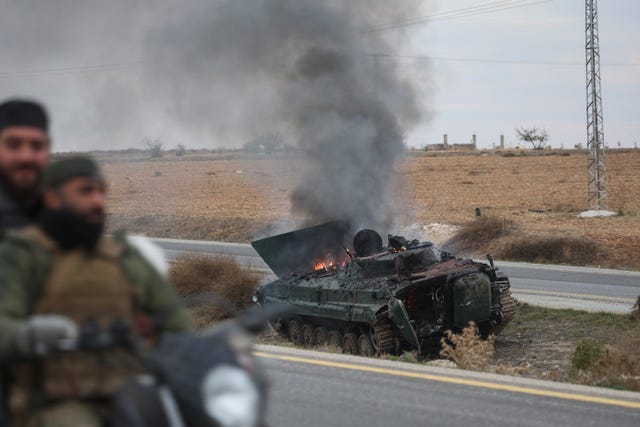Syrian Prime Minister Mohammed Ghazi Jalali said early on Sunday that the government is ready to “extend its hand” to the opposition and hand over its functions to a transitional government.
“I am in my house and I have not left, and this is because of my belonging to this country,” Mr Jalili said in a video statement.
He said he would go to his office to continue work in the morning and called on Syrian citizens not to deface public property.
He did not address reports that president Bashar Assad had left the country.
The announcement comes as the head of a Syrian opposition war monitor said Mr Assad had left the country to an undisclosed location.
Rami Abdurrahman of the Syrian Observatory for Human Rights told The Associated Press that Mr Assad took a flight from Damascus early on Sunday.
It follows Syrian insurgents claiming they had entered Damascus, capping a stunning advance across the country, as residents of the capital reported sounds of gunfire and explosions.
The insurgents also announced they had entered the notorious Saydnaya military prison north of the capital and “liberated our prisoners” there.
The night before, opposition forces had taken the central city of Homs, Syria’s third largest, as government forces abandoned it. The government denied rumours that president Bashar Assad had fled the country.
The loss of Homs represented a potentially crippling blow for Mr Assad. It stands at an important intersection between Damascus, the capital, and Syria’s coastal provinces of Latakia and Tartus — the Syrian leader’s base of support and home to a Russian strategic naval base.
Sham FM reported that government forces took positions outside Homs without elaborating. Mr Abdurrahman said Syrian troops and members of different security agencies withdrew from the city, adding that rebels entered parts of it.
The insurgency announced later on Saturday that it had taken over Homs. The city’s capture was a major victory for the rebels, who have already seized the cities of Aleppo and Hama, as well as large parts of the south, in a lightning offensive that began on November 27. Analysts said rebel control of Homs would be a game-changer.
The rebels’ moves around Damascus, reported by the monitor and a rebel commander, came after the Syrian army withdrew from much of southern part of the country, leaving more areas, including several provincial capitals, under the control of opposition fighters.
Should Damascus fall to the opposition forces, the government would have control of only two of 14 provincial capitals: Latakia and Tartus.
The advances in the past week were by far the largest in recent years by opposition factions, led by a group that has its origins in al-Qaida and is considered a terrorist organisation by the US and the United Nations.
In their push to overthrow Mr Assad’s government, the insurgents, led by the Hayat Tahrir al-Sham group, or HTS, have met little resistance from the Syrian army.

Syrian opposition fighters drive past a burning government armoured vehicle south of Hama (Ghaith Alsayed/AP)
The rapid rebel gains, coupled with the lack of support from Mr Assad’s erstwhile allies, posed the most serious threat to his rule since the start of the war.
The UN’s special envoy for Syria, Geir Pedersen, called on Saturday for urgent talks in Geneva to ensure an “orderly political transition”.
Speaking to reporters at the annual Doha Forum in Qatar, he said the situation in Syria was changing by the minute. Russian foreign minister Sergey Lavrov, whose country is Mr Assad’s chief international backer, said he feels “sorry for the Syrian people”.
In Damascus, people rushed to stock up on supplies. Thousands went to Syria’s border with Lebanon, trying to leave the country.
Many shops in the capital were shuttered, a resident told The Associated Press, and those still open ran out of staples such as sugar. Some were selling items at three times the normal price.
“The situation is very strange. We are not used to that,” the resident said, insisting on anonymity, fearing retributions.
“People are worried whether there will be a battle (in Damascus) or not.”
It was the first time that opposition forces reached the outskirts of Damascus since 2018, when Syrian troops recaptured the area following a years-long siege. The UN said it was moving non-critical staff outside the country as a precaution.
Syrian prime minister says he is ready to hand over government to the opposition

